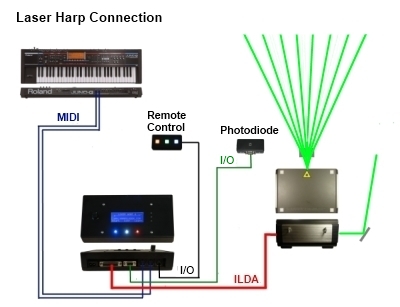| |
RGB Laser

|
A laser is a device that emits light (electromagnetic
radiation) through a process of optical amplification based on
the stimulated emission of photons. The term "laser" originated
as an acronym for Light Amplification by Stimulated Emission
of Radiation.
A gas laser is a laser in which an electric current
is discharged through a gas to produce coherent light. The gas
laser was the first continuous-light laser and the first laser to
operate on the principle of converting electrical energy to a
laser light output.
A laser diode is a laser whose active medium is a
semiconductor similar to that found in a light-emitting diode.
The most common type of laser diode is formed from a p-n junction
and powered by injected electric current.
Laser scanners use moveable mirrors to steer the laser
beam. The steering of the beam is one-dimensional and can be
two-dimensional like simulate a vibrating string...
|
Laser Harp connection
|
MIDI (Musical Instrument Digital Interface) is an industry
specification for encoding, storing, synchronizing, and
transmitting the musical performance and control data of
electronic musical instruments (synthesizers, drum machines,
computers) and other electronic equipment (MIDI controllers,
sound cards, samplers, Laser Harp).
ILDA (The International Laser Display Association) is
the worldwide non-profit trade association dedicated to advancing
the use of laser displays in art, entertainment and education.
I/O (input/output) refers to the communication
between an information processing system and a device. Inputs are
the signals or data received by the system, and outputs are the
signals or data sent from it. The term can also be used as part
of an action; to "perform I/O" is to perform an input or output
operation. I/O devices are used by a person (or other system) to
communicate with a computer.
|

|
|
|
